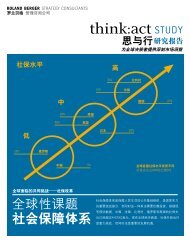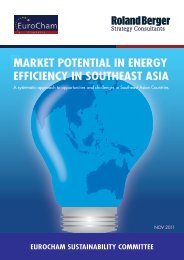Scenario planning â how to find the right strategy at ... - Roland Berger
Scenario planning â how to find the right strategy at ... - Roland Berger
Scenario planning â how to find the right strategy at ... - Roland Berger
Create successful ePaper yourself
Turn your PDF publications into a flip-book with our unique Google optimized e-Paper software.
Study 5<br />
"In emerging markets, vol<strong>at</strong>ility is <strong>the</strong> new normality.<br />
We cannot look more than three years ahead in <strong>the</strong>se countries."<br />
Siegfried Gänßlen, CEO of Hansgrohe, a leading German<br />
sanitary and fittings company<br />
Signs of more vol<strong>at</strong>ility are everywhere. The s<strong>to</strong>ck markets of<br />
emerging countries are one good example. Over <strong>the</strong> last five years,<br />
for instance, <strong>the</strong> Shanghai Composite moved between 1,500 and<br />
6,000 points, and EGX, Egypt's leading share price index, swung<br />
between 12,000 and 5,000 points. During this same period, oil<br />
prices fluctu<strong>at</strong>ed from USD 40 <strong>to</strong> 140 a barrel – a range exceeding<br />
250%. O<strong>the</strong>r commodities, such as raw m<strong>at</strong>erials from emerging<br />
markets and <strong>the</strong> developing world, also s<strong>how</strong> large price<br />
swings. For example, aluminum prices over <strong>the</strong> same five years<br />
ranged between USD 1,400 and 3,300 a <strong>to</strong>n, a difference of<br />
more than 100%.<br />
Vol<strong>at</strong>ility is found not only in <strong>the</strong> economic sphere, but in politics<br />
as well. A prime example here is <strong>the</strong> Arab world. Since <strong>the</strong><br />
Arab Spring began in January 2011, one country after <strong>the</strong> next has<br />
experienced some degree of upheaval. Foreign companies are<br />
uncertain about <strong>the</strong> consequences for <strong>the</strong>ir Middle East business<br />
and investments, which recently <strong>to</strong>taled USD 15 billion annually.<br />
f1 Given this vol<strong>at</strong>ility, managers <strong>find</strong> it increasingly difficult <strong>to</strong><br />
anticip<strong>at</strong>e <strong>how</strong> changes and trends could impact <strong>the</strong>ir business.<br />
Traditional foreign investment <strong>planning</strong> cycles of ten years or<br />
more are no longer feasible. Plans must be reviewed and revised<br />
<strong>at</strong> much shorter intervals.<br />
f2<br />
Wh<strong>at</strong> are successful companies<br />
doing differently<br />
As this book seeks <strong>to</strong> s<strong>how</strong>, emerging markets have enormous<br />
business potential. Emerging countries plan <strong>to</strong> invest a <strong>to</strong>tal<br />
of nearly USD 30 trillion in <strong>the</strong>ir B2B and B2C sec<strong>to</strong>rs over <strong>the</strong> next<br />
20 years, according <strong>to</strong> <strong>Roland</strong> <strong>Berger</strong> estim<strong>at</strong>es. These immense<br />
disbursements will improve <strong>the</strong> lives of millions of citizens across<br />
<strong>the</strong> world. But leveraging <strong>the</strong> full potential of <strong>the</strong>se investments<br />
can be achieved only by companies th<strong>at</strong> correctly position <strong>the</strong>ir<br />
str<strong>at</strong>egies.<br />
Companies must adapt skillfully <strong>to</strong> market movements. Rapid<br />
economic growth in China, for example, is turning many people<br />
in<strong>to</strong> millionaires. The number of Chinese households worth<br />
<strong>at</strong> least USD 1 million leapt by over 60% in 2010. China recorded<br />
1.1 million millionaire households th<strong>at</strong> year, considerably more<br />
than <strong>the</strong> 670,000 it had in 2009. Many of <strong>the</strong>se new millionaires<br />
prefer products th<strong>at</strong> c<strong>at</strong>er <strong>to</strong> <strong>the</strong>ir unique cultural tastes.<br />
Foreign companies now need <strong>to</strong> design and deliver products<br />
<strong>to</strong> s<strong>at</strong>isfy a more diverse cus<strong>to</strong>mer base.<br />
A good example is Hansgrohe, which wins plaudits for intern<strong>at</strong>ional<br />
competitiveness based on high-style, high-quality minimalist





